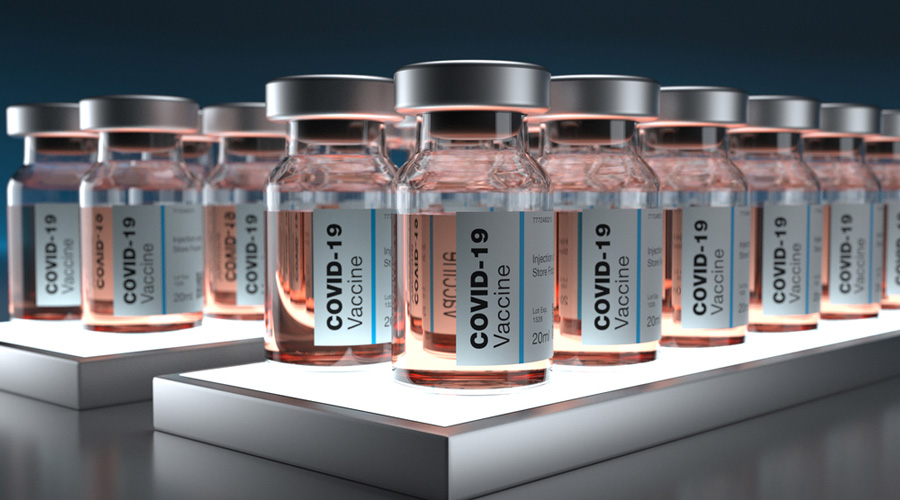The government has accepted the Covid-19 Working Group's recommendation for extending the gap between two doses of the Covishield vaccine from 6-8 weeks to 12-16 weeks, the Union health ministry said on Thursday, adding that it was a “science-based” decision devoid of any risks.
However, no change has been suggested for the dosage interval (28 days) for Covaxin, it said.
“Based on the available real-life evidence, particularly from the UK, the Covid-19 Working Group agreed for increasing the dosing interval to 12-16 weeks between two doses of Covishield vaccine. No change in interval of Covaxin vaccine doses was recommended," the ministry said.
The regimen being followed across India as of now between two doses of Covishield, manufactured by the Serum Institute of India, is 6-8 weeks.
"The recommendation of the Covid-19 Working Group was accepted by the National Expert Group on Vaccine Administration for Covid-19 (NEGVAC), headed by Dr V.K. Paul, Member (Health), Niti Aayog, at its meeting on May 12, 2021," the ministry said.
It has accepted this recommendation of the Covid-19 Working Group of extension of the gap between the first and second doses of Covishield to 12-16 weeks, the health ministry added.
Niti Aayog member Paul said, “Based on the available real-life evidence, particularly from the UK, the decision to extend it from 6-8 weeks to 12-16 weeks has been taken with confidence that there will not be an extra risk. This is a dynamic decision and, part of periodic review," he added.
Asked if the efficacy of the vaccine will be affected with this extension, Paul said, "The efficacy is so good even after the single dose...it's not a problem at all."
Serum Institute CEO Adar Poonawalla, endorsed the decision too. "This is beneficial both from an efficacy and immunogenicity standpoint... good scientific decision to increase the gap," he told NDTV.
The Centre’s move comes amid reports from several states about shortage of Covid-19 vaccines. Some states and UTs have also reported that they had to suspend its vaccination drive for 18-44 years in view of the scarcity. While Maharashtra decided on Wednesday to suspend its drive to vaccinate people in the age group of 18 to 44 years in view of vaccine shortage, Delhi also temporarily shut Covaxin-administering centres for this age group as it has run out of stock.
This is the second time in three months Covishield dosage intervals have been widened, reported ndtv.com. In March, states and UTs were told to increase the gap from 28 days to six-eight weeks "for better results".
At that time the Centre also said: "Protection was enhanced if the second dose of Covishield was administered between six and eight weeks but not later than that.”
The changes prompted Congress leader Jairam Ramesh to ask the obvious question on the ever-widening recommended interval between doses.
"First, it was four weeks for the 2nd dose, then six-eight weeks and now we are told 12-16 weeks. Is this because there are not enough stocks of the vaccines for all who are eligible or because professional scientific advice says so?" Mr Ramesh asked.
"Can we expect some transparency from the Modi government?" he added.
Working group recommendations
The Covid-19 Working Group is chaired by Dr N.K. Arora, who is director at the INCLEN Trust. Its members comprise Dr Rakesh Agarwal, Director and Dean, JIPMER, Puducherry; Dr Gagandeep Kang, professor, Christian Medical College, Vellore; Dr J.P. Mulliyal, former professor, Christian Medical College, Vellore; Dr Naveen Khanna, Group Leader, International Centre For Genetic Engineering And Biotechnology (ICGEB), JNU, New Delhi; Dr Amulya Panda, Director, National Institute of Immunology, New Delhi; and Dr V.G. Somani, Drugs Controller General of India (DCGI).
It also rejected the proposal for routinely screening all vaccine recipients with rapid antigen testing prior to COVID vaccination.
The NTAGI recommended that all pregnant women visiting for ANC care may be informed about risks and benefits associated with Covishield and Covaxin. Based on the information provided, a pregnant woman may be offered the choice to take any of the COVID 19 vaccine.
An educational tool comprising information on risk of COVID 19 infection during pregnancy, benefits associated with the vaccination and rare complications associated with vaccines like thrombosis and thrombocytopenia (with Covishield) may be developed.
Also, all lactating women are eligible to receive the COVID 19 vaccines any time after delivery, the panel suggested.
According to the current vaccination protocol, pregnant and lactating women should not be administered the shots as they have not been part of any anti-coronavirus vaccine clinical trial so far.
Global tenders
Thursday’s recommendations come amid several states reporting shortage of vaccines. Many states and UTs, including Delhi, Maharashtra, Karnataka and Telangana, have decided to opt for global tenders for procurement of anti-coronavirus shots with the domestic supply falling short to meet the rising demand.











